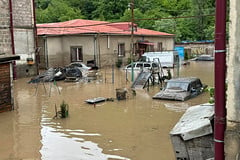
In the last seven years, progress has been made in Armenia in inclusive education, integration of migrants, and anti-discrimination law, notes the report on the country published Tuesday by the European Commission against Racism and Intolerance (ECRI) of the Council of Europe.
The aforesaid commission's report, however, noted that some issues still cause concern. For example, the lack of a full mandate on equality issues for the Human Rights Defender Institute, insufficient measures against hate speech, discrimination and bullying in schools, as well as the delay in the adoption of the equality law and the fact that it does not cover all signs of discrimination.
As a positive moment, ECRI noted the emergency measures in inclusive education aimed at continuing education for 80 percent of underprivileged schoolchildren in rural areas, which were affected by the closure of primary and secondary schools due to the covid pandemic. Reforms are underway in the education sector, including renovating schools and improving teacher training. Trainings on the language of hate/crimes based on hate or discrimination have been organized for various professionals, including police officers, investigators, prosecutors, and judges.
The new criminal law contains provisions to combat discrimination and hate crimes, with an open list of protected characteristics, including "race," skin color, belonging to an ethnic minority, religion, and other circumstances of a personal and social nature.
A free mobile app (MigApp) for migrants was created, special measures were taken to integrate migrant children into the school system, and the launch of a new electronic platform for registering work permit announcements in January 2022 significantly facilitated access to work for migrants.
However, as noted by ECRI, the Institute of Human Rights Defender received almost no complaints about discrimination due to the lack of comprehensive anti-discrimination law. In its report, ECRI recommends that the ombudsperson of Armenia be legislatively empowered to ensure full equality.
There is no special system for combating discrimination and bullying in Armenia, especially regarding students who are representatives of the LGBT community. There is insufficient awareness of equality issues among students and school staff. The authorities have not shown any initiative or support to counter hate speech through counter-speech and alternative speech, ECRI noted. It was recommended to create effective school policies and mechanisms for preventing, monitoring and responding to bullying, especially homophobic attacks. The authorities should also take measures to prevent hate speech on the internet.
The Armenian authorities should ensure that the draft law on equality is adopted within a reasonable time and provides for effective, moderate, and deterrent sanctions for cases of discrimination. The law should also clearly cover all grounds of discrimination related to ECRI, including sexual orientation, gender identity and sexual characteristics, which is necessary for more effective protection of the LGBT community, ECRI said.
Also, ECRI advises the Armenian authorities to give priority attention to the equality of the LGBT community, the report stated.
Homosexuality should not be considered and registered as a mental disorder, LGBT-aphobic discourse should not remain uncontested in the political sphere, it said.
In its report, ECRI then recommends that the Armenian authorities adopt an integration strategy as a matter of priority, accompanied by financial resources and capacity-building measures that will ensure the effective implementation of specific actions for refugees, asylum seekers and migrants, as well as any other persons or groups of persons—including language courses, and civic orientation courses.






















